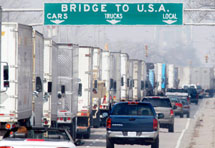
Cargo Security
The transportation industry has always had to deal with the issue of cargo theft. We’ve all heard of freight that “fell off the back of the truck”, and somehow mad to into the hands of an unintended recipient.
Most companies (especially in the consumer products industry) factor in the possibility of pilferage or “shortage” within their supply chains, however, as thieves become more sophisticated the losses and associated costs can become significant.
In one scheme targeting freight brokers, an individual (posing as freight broker) phones “ABC Carrier” and asks for their insurance and authority package after promising the carrier a shipment. Once the authority package is received the scammer then registers an email address at “abccarrier@gmail.com” then phones a legitimate freight broker to bid on a shipment that broker is offering. Once the price is agreed (of course the scammer will bid the lowest) the legitimate brokers asks the Scammer (now posing as ABC Carrier) to send his authority package and insurance.
Once the scammer sends the package he instructs the freight broker to “email” the dispatch confirmation to him.
Now the scammer has a ready shipment waiting for him that he is free to pick up and the best part is that the victim willingly loads the shipment and waives goodbye to the driver. After 2-3 days when the broker phones ABC Carriers for a delivery update ABC Carrier informs the broker that they have no knowledge of the shipment and that they both have been duped. Imagine, with 2-3 phone calls a savvy thief can disappear into the sunset with a full truckload of cargo.
How can the broker and the shipper protect themselves from such a fraud? The first thing I recommend to any shipper is the record the license place of the Tractor pulling the trailer that is being used for pickup – this includes LTL freight. It is much more difficult for a fraudster to steal an entire truck then steal a shipment. Having the license plate gives authorities the ability to quickly recover the equipment used for the fraud in many cases the driver. Additionally, when communicating with driver be on alert for clues that may suggest he not legitimate – in some cases where the product is high value it is not inappropriate to ask for Identification.
For the Broker, verifying the legitimacy of a carrier can be done with a number of different tactics. First and foremost a carrier`s true phone, fax and email addresses (for carriers with U.S. authorities) are listed on the FMCSA website next to their safety scores. A broker should be very careful not to issue dispatch information to a number or email address not officially listed and verified.
A broker should also try to be very transparent with the shipper in terms of what carrier the broker is using for the pickup. If the shipper expects “ABC Carriers” to handle the pickup and the truck says something different then a red flag should immediately be raised.
The careful vetting of carriers is a big part of the brokerage function. However, both shipper and broker must work together to ensure to effectively guard against the threat of cargo theft.